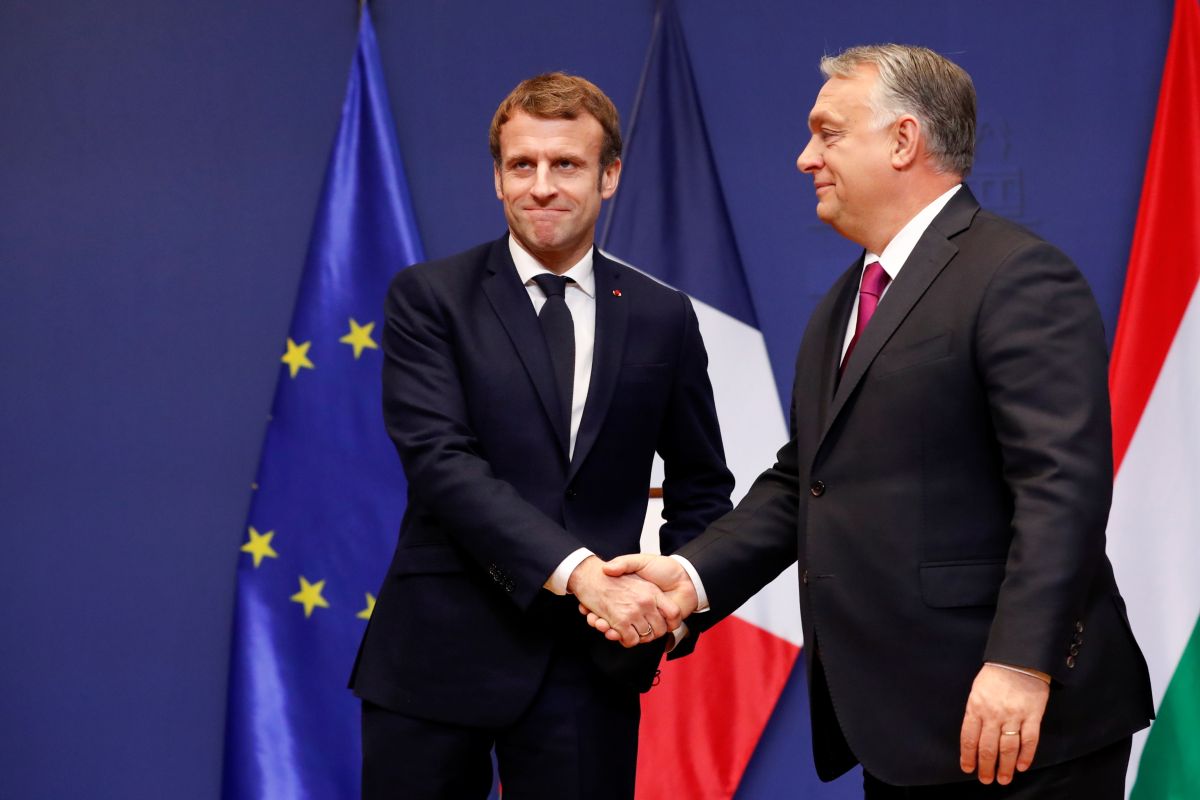Hungary and the Russian Threat of Further Aggression Against Ukraine
Hungary considers the dispute between the West and Russia over renewed Russian aggression against Ukraine is of no concern to it. The government defines its stance from a neutral third party position. It neither condemns Russia’s actions nor supports Ukraine. Past actions indicate Hungary will not veto EU and allied actions against Russia if it would be the only country to break from common positions, however, it will continue to act to the benefit of Russia by trying to weaken Euro-Atlantic structures and impede cooperation with Ukraine.
 Fot. Russian Look/ Kremlin Pool/ FORUM
Fot. Russian Look/ Kremlin Pool/ FORUM
Determinants of the Hungarian Approach
Hungary perceives the threat of a new Russia-Ukraine conflict primarily through the prism of its close bilateral relations with Russia. Short-term economic benefits, mainly cheap gas, are the priority. Another important factor is the crisis in relations with Ukraine ongoing since 2017 concerning the dispute over the around 150,000-strong Hungarian minority in Transcarpathia. It stems from Hungary’s policy towards Russia and the Hungarian minority in countries neighbouring Hungary, as well as Ukraine’s efforts to strengthen the sense of nationhood among its citizens. The latest element of this dispute is the Ukrainian parliament’s planned adoption of an amendment to the provisions on dual citizenship to prohibit those who have any citizenship other than Ukrainian, including Hungarian, from holding a number of positions in public administration.
Hungary sees Ukraine using the conflict in the eastern part of the country as a pretext to limit the rights of minorities. In turn, the Hungarian authorities use their minority in other countries as a foreign policy instrument. For years, they have blocked NATO-Ukraine Commission meetings, citing minority issues, as well as Ukraine’s rapprochement with Euro-Atlantic structures. At the end of 2021, the Hungarian authorities also opposed the admission of Ukraine to the NATO Cooperative Cyber Defence Centre of Excellence in Tallinn (last year, however, they agreed to convene the Commission and in 2020 did not veto recognition of Ukraine as an Enhanced Opportunities Partner). Siding against Ukraine, the Hungarian government signed last September a long-term gas agreement with Russia that allows Gazprom to exclude Ukraine from gas transit to Hungary. This will impact Ukraine’s security and financial situation. Although Hungary started selling natural gas to Ukraine (up to 8 million m3 per day) in January, it is much more expensive than the gas that previously flowed directly from Russia because transit countries, including Hungary, charge additional fees.
The Hungarian perception of the security situation has not changed despite the recent mass concentration of Russian troops on the border with Ukraine and Russia’s list of demands to the U.S. and NATO. Hungary continues to recognise migration from outside the EU as the greatest and immediate threat to the state and the Union, downplaying the threat posed by Russia. This explains the country’s low commitment to NATO’s deterrence on the Eastern Flank.
Actions
Given its impulses, the Hungarian government is building a pro-Russian narrative about the sources and a possible resolution of the current crisis. Numerous statements by members of government show that, in their understanding, the parties to the conflict are primarily the U.S. and Russia, which should set the terms of a peaceful resolution between themselves. In this approach, the Hungarian government, for example, Minister of Foreign Affairs Péter Szijjártó, claims to speak for the entire region when it states that Central Europe is a neutral observer of events and it is in its interest to stay out of the conflict and for an agreement between “East and West” to be reached through negotiations. The Hungarian government is the only one in the region to relativise Russia’s responsibility for the growing tensions, by claiming that both sides are responsible for the escalation and, in Szijjártó’s words, “creating a Cold War atmosphere”.
The attempt to symmetrically evaluate the actions of Russia and the West leads Hungary to the lack of a firm stance on the side of its allies, which weakens coherence. For example, the Hungarian government has been silent on Russia’s demands to withdraw NATO forces from the Eastern Flank. At the same time, after talks with representatives of the U.S. administration, Minister of National Defence Tibor Benkő confirmed that Hungary did not want “foreign forces”, meaning allied troops, to be sent to their territory so that Russia would not perceive it as a demonstration of force. Also, the visit of Prime Minister Viktor Orbán to Moscow on 1 February was presented in Russian propaganda as proof of divisions in the EU and NATO. Although Orbán explained the meeting as his desire to conduct a “peace mission” on behalf of the West, its effect was only a reiteration of President Vladimir Putin’s postulates in the presence of an EU and NATO member state representative, who not only did not oppose them at that moment but also criticised EU sanctions against Russia. At the same time, Hungary has always voted to prolong the sanctions in the European Council so as not to break unanimity, which was reached largely thanks to former German Chancellor Angela Merkel. Cooperation on this matter was a way for Orbán to maintain good relations with Germany.
The Hungarian government makes any support available to Ukraine dependent on improving the situation of the Hungarian minority in Transcarpathia. This implies that Hungary, as Szijjártó hinted, would not support sending an EU military training mission to Ukraine. It emphasises that even in the event of a Russia-Ukraine conflict, it will not side with Ukraine unless it introduces significant changes to its minority policy. This approach is consistent with the position taken by Russia, which also accuses Ukraine of restricting the rights of the Russian-speaking part of its society.
The convergence became evident after the Russian annexation of Crimea in 2014 when the Hungarian government raised demands of autonomy for the Hungarian minority in Transcarpathia. It was not a single case either: in the political discourse, the Fidesz government maintains the goal of “unifying the nation beyond the borders of the state” and the conviction that “Hungarian affairs were not satisfactorily regulated after World War II”. In domestic politics, this translates into shaping a nationalist discourse upholding the faith of citizens that the provisions of the Trianon Treaty are not final and that there is a possibility of revision of borders in the future. At the same time, in foreign policy, the Hungarian support for the efforts of the Bosnian Serb leader Milorad Dodik, who regularly threatens the secession of Republika Srpska from Bosnia and Herzegovina, shows an ambiguous attitude towards the principle of the inviolability of borders and respect for the territorial integrity of other states.
Conclusions
Hungary does not have the potential to set the direction of NATO’s or the EU’s actions in the event of a possible new intensification of the conflict by Russia. As before, the country will not go it alone on community decisions such as imposing further sanctions on Russia. However, persuading Hungary to adopt restrictions will be more difficult given the current conditions in European policy as it is doubtful whether the new German coalition government or the French president will be able to play a similar unifying role as Chancellor Merkel. In addition, experience shows that Hungary may veto further steps aimed at greater NATO support for Ukraine.
Unlike Poland, Hungary will support postulates of some European countries, mainly France, for an agreement with Russia through concessions. The Hungarian approach, including its open criticism of sanctions, strengthens the rift and deepens divisions between the allies, reducing the chances of an effective response to the Russian demands. In addition, both Orbán’s recent visit to Moscow and Hungary’s reluctance to accept NATO forces shape an external perception of the alliance’s Eastern Flank in a way that is unfavourable to Poland, as they show a lack of common expectations of Central and Eastern European states towards the Alliance.
In the event of an escalation of the conflict, Russia will continue to use the anti-Ukrainian rhetoric of the Hungarian government in the information war against Ukraine. Hungary’s policy towards this country will serve Hungarian-Russian relations and will not improve the situation of the Hungarian minority in Transcarpathia. This is indicated by the current Hungarian strategy of blocking Ukraine’s Euro-Atlantic aspirations, which has not brought any positive effects for the Hungarian minority, but has served Russia’s interests.
Hungarian foreign policy does not seek a change in current borders. Hungary officially confirms that it respects the principles of respect for the sovereignty and territorial integrity of states. However, some actions of the Hungarian government, including the demand for extensive autonomy for Hungarians in Transcarpathia right after the Russian annexation of Crimea or supporting secessionist movements in Bosnia and Herzegovina, call into question its actual commitment to these principles.




